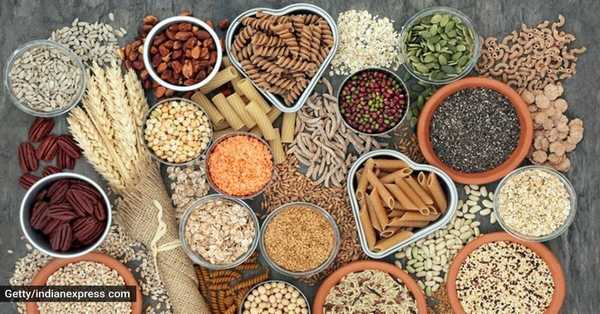Some Interesting Golden Merits Of Low-Fat Grains.
Grains are the seeds of grass-like plants called cereals. Some of the most common varieties are corn, rice, and wheat.Some seeds of non-grass plants, or pseudocereals, are also considered whole grains, including buckwheat, quinoa, and amaranth.
Whole-grain kernels have three parts :
(1) Bran : This is the hard, outer It contains fiber, minerals, and antioxidants.
(2) Endosperm: The middle layer of thegrain is mostly made up of carbs.
(3) Germ : This inner layer has vitamins, minerals, protein, and plant compounds.
High in nutrients and fiber :
Whole grains deliver many important nutrients. These include:
(1) Fiber: The bran provides most of the fiber in whole grains.
(2) Vitamins: Whole grains are particularly high in B vitamins, including
niacin, thiamine, and folate
(3) Minerals: They also contain a good amount of minerals, such as zinc,
iron, magnesium, and manganese.
(4) Protein: Whole grains boastseveral grams of protein per serving.
(5) Antioxidants: Manycompounds in whole grains act as antioxidants. These include phytic acid,
lignans, ferulic acid, and sulfur compounds.
(6) Plantcompounds: Whole grains deliver many types of plant compounds that play a
role in preventing disease. These include polyphenols, stanols, and sterols (6Trusted Source).
Lower your risk of heart disease :
One of the biggest health benefits of whole grains is that they lower your risk of heart disease, which is the leading cause of death worldwide. A review of 10 studies found that three 1-ounce (28-gram) servings of whole grains daily may lower your risk of heart disease by 22% (8Trusted Source).Similarly, a 10-year study in 17,424 adults observed that those who ate the highest proportion of whole grains in relation to their total carb intake had a 47% lower risk of heart disease .Researchers concluded that heart-healthy diets should include more whole grains and fewer refined grains.Most studies lump together different types of whole grains, making it hard to separate the benefits of individual foods.Still, whole-grain breads and cereals, as well as added bran, have been specifically linked to reduced heart disease risk .
Lower your risk of type 2 diabetes :
Eating whole in place of refined grains may lower your risk of type 2 diabetes .A review of 16 studies concluded that replacing refined grains with whole varieties and eating at least 2 servings of whole grains daily could lower your risk of diabetes .In part, this is because fiber-rich whole grains can also help with weight control and prevent obesity, a risk factor for diabetes.Moreover, studies have linked whole grain intake to lower fasting blood sugar levels and improved insulin sensitivity .This could be due to magnesium, a mineral found in whole grains that helps your body metabolize carbs and is tied to insulin sensitivity .
When your risk of chronic disease is reduced, your risk of dying prematurely also goes down.In fact, one study suggested that whole grain intake specifically lowered the risk of dying from heart disease, as well as any other cause.The study used data from two large cohort studies, adjusting for other factors likely to influence death rates, such as smoking, body weight, and overall eating patterns.Results indicated that every 1-ounce (28-gram) serving of whole grains was linked to a 5% lower risk of death.
Feel Energize and Take Health Benefits of Eating Whole Grains :- Published By The Beyond News (Food & Health).
